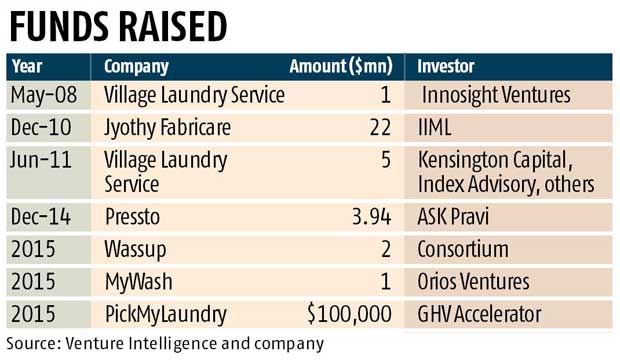The start-up ecosystem has in the past couple of years seen several online laundry businesses like PickMyLaundry, Laundrywala, Dirk Da Dhobi, Wassup, MyWash and Laundry Basket beginning operations. Laundry was a Rs 17,400-crore business in India in 2012 and is expected to grow to Rs 48,900 crore by 2018. The sector is fragmented with 767,000 establishments, 98 per cent micro-sized laundries with fewer than 10 workers, says a report by Euromonitor International.
Unlike other home delivery services, laundry faces unique challenges. In the past two years, Indian start-ups have experimented with both the asset light aggregator model and with heavy investments in processing units or tie-ups with institutional laundries.
Wassup, which recently acquired the Mumbai-based Chamak, Dirk Da Dhobi and Laundrywala have chosen the asset heavy model. PickMyLaundry and MyWash have taken the aggregator route. All these players provide services like wash and fold, wash and iron, and drycleaning.
Players feel owning the laundry and controlling quality is extremely important. Maintaining quality is a challenge for for aggregators.
Srinivas Rao, who had sold his laundry services chain to Jyothi Laboratories in 2009 and is now an independent consultant, said, “Compared to other parts of the world, when it comes to laundry, the Indian consumer is finicky. Some want their clothes folded, some do not like any crease. When it comes to starch, women like to issue specifications. At the end of the day, laundry is a service-oriented business where quality matters and the aggregator model has huge challenges.”

Dirk Da Dhobi has targeted large residential complexes for customers. When asked why it did not choose the aggregator model, Lewis said, “In the aggregator model, you will compromise on quality. Before starting our venture we did think about the aggregator model, but what we saw convinced us that owning the back-end was necessary.”
Noida-based Laundrywala’s co-founder Divya Aggarwal expressed a similar concern. The company, which started operations in January, has reached break-even. It is in talks with investors to raise pre-Series-A funding and has 150 orders per day.
Laundrywala has operations in Noida and South Delhi and will expand to Gurgaon and then, Delhi. Aggarwal said Laundrywala would follow a hybrid model by tying up with big laundry players that catered to institutions and had excess capacity. “We will have two-three people at these centres for quality checks. We have done a pilot and have tied up with two large players to cater to Gurgaon,” she added.
According to Aggarwal, Laundrywala’s repeat customers are almost 40-45 per cent. One of the long-term goals of Laundrywala is to be a one-stop solution for all apparel-related services. It will soon offer shoe cleaning and repairing.
Gaurav Agrawal, co-founder of the Delhi-based PickMyLaundry, an aggregator, said it had its own process to ensure quality. “We make sure that all products used are standardised. Issues like torn clothes or buttons missing can be eliminated through technology,” he added. PickMyLaundry follows a hub-and-spoke model and has improvised on processes. It has an order audit before and after processing of garments. “We have customers who have placed orders more than 50 times,” Agrawal said.
PickMyLaundry, which has raised $100,000 from Gurgaon-based GHV Accelerator, is on its way to raise the next round of funding and is targeting 10,000 clothes per day from the present 2,500-3,000. On average, it caters to 30 clothes per order, the highest among all players in the category.
Since the target audience is bachelors and working couples, most laundry players charge by the kilogram. Many have monthly packs for a set number of clothes and pick-ups.
All is not well at Bengaluru-based MyWash, which has been facing flak from customers. Founded last December, the company washes 4,000-5,000 clothes per day. “They are reviewing their operations and delivery mechanism,” said a source close to the company. The company’s social networking page is buzzing with complaints on quality.
Large players like Jyothi Laboratories, which has a presence in this segment, are also running at a loss. Rao said the industry would consolidate in the next couple of years.
“The segment is in chaos with players, offering absurd discounts, but there is a need for good on-demand services and we should see two or three serious players emerging in the next couple of years,” he said.

)
